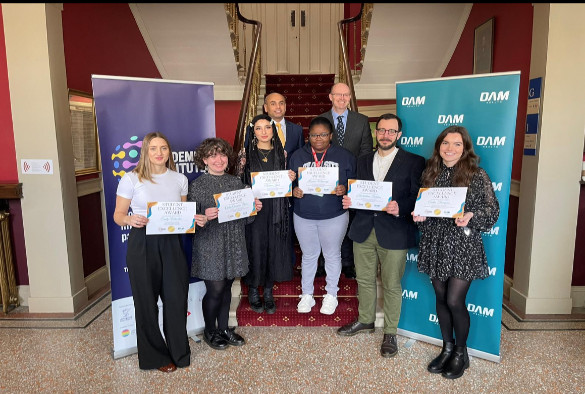
A unique collaboration between The Pandemic Institute in Liverpool and leading healthcare company DAM Health has awarded seven postgraduate students grants of £3500 in its latest round of funding.
The second anuual Student Excellence Awards presentation took place at The Liverpool Medical Institution with family, friends, colleagues and academic mentors attending the ceremony. Seven students received awards from Professor Frank Joseph, DAM Health’s Medical Director and Dr Ray Kent, Chief Operating Officer of The Pandemic Institute, both of whom were members of the judging panel.
Postgraduate students from The University of Liverpool, Liverpool John Moores University (LJMU) and Liverpool School of Tropical Medicine (LSTM) were invited to apply in Autumn 2022 across scientific, medical and humanities fields.
Following on from The Student Excellence Awards’ debut last year, the grants will once more help boost the career development opportunities of each winner, enabling them to attend international conferences or take up training and development opportunities at world-leading laboratories.
The seven winners are:
- Caitlin Greenland-Bews (LSTM)
Study: Development and Evaluation of Non-Sequencing Surveillance Methods for Emerging Pathogens - Caitlin Thompson (LSTM)
Study: Development and Evaluation of Monoclonal Antibodies for use in the Diagnostics of Emerging Infectious Diseases - Emily Wharton (LJMU)
Study: COVID-19 pandemic: A ‘stair fall pandemic’ in older adults? - Kostas Liatsikos (LSTM)
Study: Respiratory pathogens in adults: Exploring associations, effects, and prophylactic pharmacological measures - Neelam Iqbal (University of Liverpool)
Study: The environmental and social drivers of human risk to Dengue, Chikungunya and Zika virus in the UK. - Rosheem Mthawanji (University of Liverpool)
Study: Vector in the machine: how accurately can mosquito transmission of viruses be predicted by machine learning? - Mercy Chepkirui Terer (LSTM) Based in Kenya (KEMRI)
Study: Application of machine learning techniques for health record linkage in Kenya: Methods for leveraging existing data for pandemic preparedness.
Dr Ray Kent, Chief Operating Officer at The Pandemic Institute said: “At The Pandemic Institute, we strive to protect the world from emerging infections and future pandemic threats. We are passionate about developing the next generation of leading scientists to help achieve our ambitious goals. Thanks to the generosity of DAM Health, one of our sponsors, we have a wonderful opportunity with the Student Excellence Awards 2023 to support some exceptionally talented researchers. The quality of the applicants made it hard to choose the winners, but we are pleased that there are awardees from all three universities involved in The Pandemic Institute. This is testament to the calibre of students studying for a higher degree in our great city of Liverpool. It is exciting to see the breadth of topics that the awardees are working on, extending from traditional laboratory-based biological sciences, through to clinical science and data science.”
Professor Frank Joseph, Medical Director of DAM Health said: “It was amazing to be able to reward the students for their amazing endeavours. The quality of the work and the presentations were exceptional and spanned a wide variety of topics looking at more than just what people traditionally think of with pandemics. Some of the technology and methods are revolutionary and will have significant impacts in the immediate and distant future. It was also amazing to be able to recognise students from across the globe. As DAM Health starts to deliver post-pandemic health care solutions for a range of conditions that the pandemic has brought to the fore, the Student Excellence Awards are a great opportunity to recognise the hard work that has gone on to get us to where we are today.”
Image caption L-R: Emily Wharton, Caitlin Greenland-Bews, Neelam Iqbal, Professor Frank Joseph, Rosheem Mthawanji, Dr Ray Kent, Konstantinos Liatsikos, Caitlin Thompson.